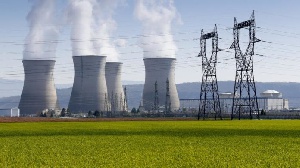Today, global climate change is one of humanity’s greatest challenges. Within the next fifty years, global warming will increase to the detriment of the world’s population.
Weather extremities such as droughts, floods and cyclones will occur more frequently and forcefully, causing insecure living conditions, food shortage and forced migration.
It is the pressing responsibility of the international community to work together and reverse global warming, as well as to provide assistance to those most vulnerable to global weather extremities.
Countries in sub-Saharan Africa increasingly need to deal with the practical consequences of this phenomenon and need to manage the specific political challenges that lie ahead.
Ghana is one of Africa’s fastest growing economies and has made significant strides in poverty reduction. Economic growth since 2010 has been fueled by high commodity prices and new-found wealth in offshore oil.
But Ghana’s high GDP growth rate of 14 percent in 2011 could not be sustained: it fell to 4 percent in 2014 and 3.9 percent in 2015.
Climate variability and change are partly responsible, posing a threat to future growth and development. Rising sea levels, drought, higher temperatures and erratic rainfall negatively impact infrastructure, hydropower production, food security and coastal and agricultural livelihoods.
The electricity supply is currently vulnerable to climate change. About 67% of electricity generation in the country is from hydropower and 33% is from thermal generation using diesel (Energy Statistics, 2006), with a small contribution (less than 1%) from small-scale solar systems.
By 2020 the energy supply is expected to be more diversified, according to the National Energy Plan for 2006-2020, with a larger contribution from natural gas and renewables, and potentially from nuclear power.
"It is imperative that countries developing a sustainable energy mix tend to embrace all economically viable energy sources available to them. Ghana has a vast range of renewable opportunities at her disposal, however the number of baseload options is limited", noted Mr. Dmitry Shornikov, CEO of Rosatom Central and Southern Africa.
Baseload generation is vitally important to the economic development of any country and is commonly described as the minimum amount of power needed by the grid to effectively run an economy.
Renewables have their benefits in off grid or mini grid applications but unfortunately cannot provide baseload power as they are intermittent by nature, they are unable to produce electricity when the sun is not shining and when the wind is not blowing.
Nuclear on the other hand is a very stable and affordable source of baseload power, new generation plants have a net capacity factor of over 90% whereas renewables have net capacity factors of less than half of that.
Mr. Dmitry Shornikov added "Countries that include nuclear in their energy mix are assured an improved reliability of supply, significantly reduced greenhouse emissions, greater affordability of the Localized Cost of Electricity (LCOE) and are able to develop a highly skilled workforce. A diverse energy mix with the inclusion of renewables and nuclear power will contribute immensely to the national economy growth and will make local businesses more competitive andresilient".
Nuclear energy is a vital component in the development of a clean energy mix in any country. At present, nuclear reactors alone generate a third of all low-carbon power in the world, while the share of nuclear power in the global energy mix is currently around 11%, this figure is said to be increased to 18% by 2030 and 25% by 2050.
Ghana’s agenda to integrate nuclear power into its power generation mix is progressing steadily with the Ministry of Energy setting a target to fully activate the second phase of the project by the end of the first quarter of this year.
Business News of Monday, 4 February 2019
Source: ghanaguardian.com

















